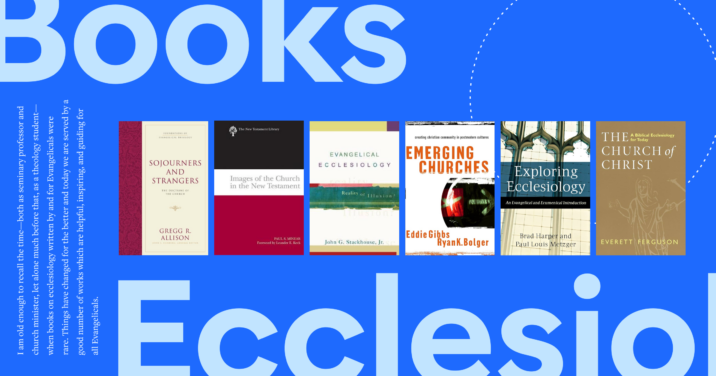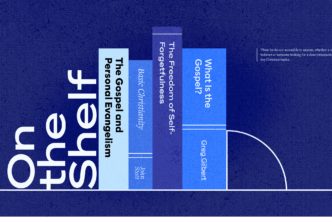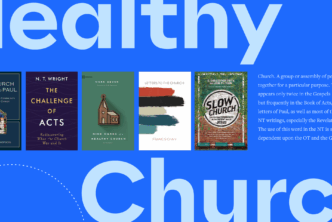I am old enough to recall the time—both as seminary professor and as a church minister and (much before that) as a theology student—when books on ecclesiology written by and for evangelicals were rare. Things have changed for the better, and today we are served by a good number of works on the church which are helpful and inspiring for all evangelicals.
That is not to say that we evangelicals have resolved the dilemma of the doctrine of the church. Far from it. As is well-known, evangelicalism is an interdenominational movement without any overarching ecclesiological vision such as that present in Roman Catholicism or the various forms of Orthodoxy. It is rather certain foundational theological convictions that help unite evangelicals from across the ecclesiological spectrum, from mainline churches such as Lutheran, Presbyterian, and Episcopal/Anglican, to free churches, including Baptist, Congregationalist, Holiness and some Methodists, all the way to Pentecostals—currently the biggest grouping—and independents.
An indication of the challenge and complexity of constructing a distinctively evangelical ecclesiology is the title of a collection of essays published about two decades ago, Evangelical Ecclesiology: Reality or Illusion? (Baker, 2003). The book is still worth reading. It tackles honestly and frankly the question of whether any talk about a distinctive evangelical ecclesiology is no more than an oxymoron. Some leading North American evangelicals representing several denominations offer insights and proposals. In keeping with the title, the book is exploratory in nature.
In a highly useful theological and pastoral study titled Exploring Ecclesiology: An Evangelical and Ecumenical Introduction (Brazos Press, 2009), Multnomah University professors Brad Harper and Paul Louis Metzger seek to outline an evangelical ecclesiology which would also be appealing to a wider audience. While I have found that book very useful in the classroom, the distinctively evangelical doctrine of the church is yet to be constructed even after its launching.
Evangelical pastors, theologians, and students, however, need to read beyond ecclesiologies written for the benefit of our own movement. We also badly need to be informed about ecclesiologies outside our own purview, including the two oldest Christian traditions; namely, the Orthodox and Roman Catholics. At the same time, we should also be knowledgeable about the latest trends in ecclesiological discussions—such as the missional nature of the church, the emerging churches, or the effects of globalization on the makeup and nature of the church of Christ in the world. With these caveats and desiderata in mind, I have compiled a brief list of recommended titles. (Note that the location of the authors and editors is dated to the time of the publication of the book introduced.)
An intuitive way to deepen ecclesiological learning is to turn to the Bible. Fortunately, we are well-served in that area. Everett Ferguson’s now classic The Church of Christ: A Biblical Ecclesiology for Today (Eerdmans, 1997) is a massive study of the Bible’s teaching on the emergence, nature, mission, leadership, and worship of the church. Both the Old and the New Testament materials relevant to the Christian community are analyzed and explained with great expertise and clarity by this veteran Abilene Christian University professor—who has, not so incidentally, published many other biblical and early Christianity studies.
Another classic, Paul. S. Minear’s Images of the Church in the New Testament (Westminster John Knox, 2004), originally published in 1960, is one of the most widely used textbooks on the biblical teaching on the church. Harvesting almost one hundred biblical images, both “minor” and “major,” the author expands and enriches our understanding of the Christian community in a remarkable way.
The Southern Baptist Theological Seminary’s Gregg R. Allison has produced a landmark work, Sojourners and Strangers: The Doctrine of the Church (Crossway, 2012). The fifth volume in the series Foundations of Evangelical Theology, it presents the first comprehensive doctrine of the church by an evangelical leader. Allison’s work is biblically rooted, historically informed, and theologically sound. Allison talks not only about the tasks of the church, as important as they are, but also about the essence and nature of the church.
While there is no want of books on the phenomenon known under the nomenclature “emerging” or “emergent” churches, my big recommendation is for the title Emerging Churches: Creating Christian Community in Postmodern Cultures (Baker Academic, 2005), produced by my two Fuller Seminary colleagues, Eddie Gibbs and Ryan K. Bolger. The book is unique in combining biblical–theological and cultural analysis with a wide survey of pastors and leaders in the USA and the UK. Any evangelical wanting to get a reliable and well-presented view of this debated trend may want to go first to this storehouse.
Similarly, while there is no lack of publications on another important current ecclesiological trend; namely, “missional ecclesiology” or “church as mission”—a theme dear to all evangelicals—my recommendation goes to two books. Accessible, informative, and engaging, they provide the background, key ideas, and healthy critical reflections on the relationship between church and mission.
The first is Missional Church: A Vision for the Sending of the Church in North America (Eerdmans, 1998), edited by the American “Grand Old Man” of missional ecclesiology, Darrell Guder of Princeton Theological Seminary.
The second is The Shaping of Things to Come: Innovation and Mission for the 21st Century Church, the revised edition (Baker, 2013), written by two Australian missiologists, innovators, and global leaders, Michael Frost and Alan Hirsch.
The Holiness-tradition rooted Azusa Pacific University’s Jennifer M. Buck’s Reframing the House: Constructive Feminist Global Ecclesiology for the Western Evangelical Church (Pickwick, 2016) is a bold attempt to provide a platform for women’s voices through the testimonies and thoughts of female theologians from various parts of the world. This work is past due. Whereas women’s role in the church has been touted vocally by the “liberals,” it is time for evangelicals to offer their distinctive views—taking also into consideration our movement’s global and contextual extent. I am receiving a lot of positive feedback about this book from my (Fuller) seminary students coming from all denominations and all continents.
Speaking of the global extent of evangelicalism and the fact that our movement is most rapidly growing in the Global South (Africa, Asia, Latin America), we are finally served by an excellent sampling of ecclesiological insights from around the world: The Church from Every Tribe and Tongue: Ecclesiology in the Majority World (Langham Global Library, 2018). It is also available as part 5 of the six-volumes-in-one, titled Majority World Theologies (InterVarsity, 2020). The three evangelical editors, all with long experience in teaching, pastoring, and researching in Latin America, Africa, and Asia alongside North America, Gene L. Green, Stephen T. Pardue, and K. K. Yeo, have put together a most enlightening collection of diverse evangelical voices and testimonies.
Having mentioned above that evangelicals should also know more about the ecclesiologies and church life outside their own borders, here are two important recommendations. A comprehensive and well-written primer to the ecclesiological understanding of the world’s largest Christian community, the Roman Catholic Church, is written by Fr. Thomas Rausch, SJ, of Loyola-Marymount in Los Angeles, and is titled Towards a Truly Catholic Church: An Ecclesiology for the Third Millennium (Michael Glazier, 2005). A good friend and long-term dialogue partner with evangelicals, Fr. Tom is successful in introducing in a highly accessible manner key Catholic ideas about the church to Christians with little or no previous knowledge. Furthermore, the book’s irenic tone will make it more profitable reading for non-Catholics. The other highly recommended, accessible, and well-written book is by the late Eastern Orthodox Bishop of England, Timothy Kallistos Ware, The Orthodox Church, new edition (Penguin, 1993). A convert from Anglicanism, this highly respected churchman and academician—a lecturer at Oxford University—brings to light the riches of the oldest and most ancient Christian tradition particularly to non-Orthodox folks.
My own widely used textbook, Ecclesiology. A Historical, Global, and Interreligious Introduction, in its recent second edition (InterVarsity, 2019; orig. 2003) seeks to provide a “map” for all readers—pastors, theologians, theology students, and interested lay folks—into all things ecclesiological. It includes an introduction to biblical and historical developments and to (almost) all major denominational traditions and their key theologians. But not only that, the book also surveys so-called global and contextual ecclesiologies, including church doctrines from various continents, from women and men, and from Christians of different colors and agendas. On top of that, the idea of religious community among the Jews, Muslims, Buddhists, and Hindus are also introduced and briefly compared with Christian understandings.
In my teaching ministry, I have found particularly helpful two recent massive handbooks which cover all main topics, figures, and themes of ecclesiology:
First, The Oxford Handbook of Ecclesiology (Oxford University Press, 2022), edited by Paul Avis, a highly respected Church of England leader and theologian.
Second, The Routledge Companion to the Christian Church (Routledge, 2008), edited by the late Gerald Mannion, a leading Catholic ecclesiologist and Lewis S. Mudge, another noted expert from the Graduate Theological Union.
Together, these two tomes provide invaluable resources and quick access to various topics for busy pastors and students with no time to consult a whole book!
Read the books Dr. Kärkkäinen recommends in Logos
An Introduction to Ecclesiology: Historical, Global, and Interreligious Perspectives, rev. ed.
Regular price: $24.99
Exploring Ecclesiology: An Evangelical and Ecumenical Introduction
Regular price: $29.99
Images of the Church in the New Testament (The New Testament Library | NTL)
Regular price: $22.99
Sojourners and Strangers: The Doctrine of the Church (Foundations of Evangelical Theology)
Regular price: $30.99
Emerging Churches: Creating Christian Community in Postmodern Cultures
Regular price: $31.99
Missional Church: A Vision for the Sending of the Church in North America
Regular price: $15.99
The Shaping of Things to Come: Innovation and Mission for the 21st-Century Church
Regular price: $22.99
Reframing the House: Constructive Feminist Global Ecclesiology for the Western Evangelical Church
Regular price: $13.75
The Church from Every Tribe and Tongue: Ecclesiology in the Majority World
Regular price: $19.99
Why read books like these in Logos?
Related articles
- Ecclesiology: What Do We Believe about the Church?
- What Are the 8 Best Books on Preaching?
- 6 Black Theologians from Church History You Should Know
- 11 Best Books on the Trinity (for All Levels of Study)
- 5 Best Books on the Holy Spirit (A Doctor of Theology’s Picks)





